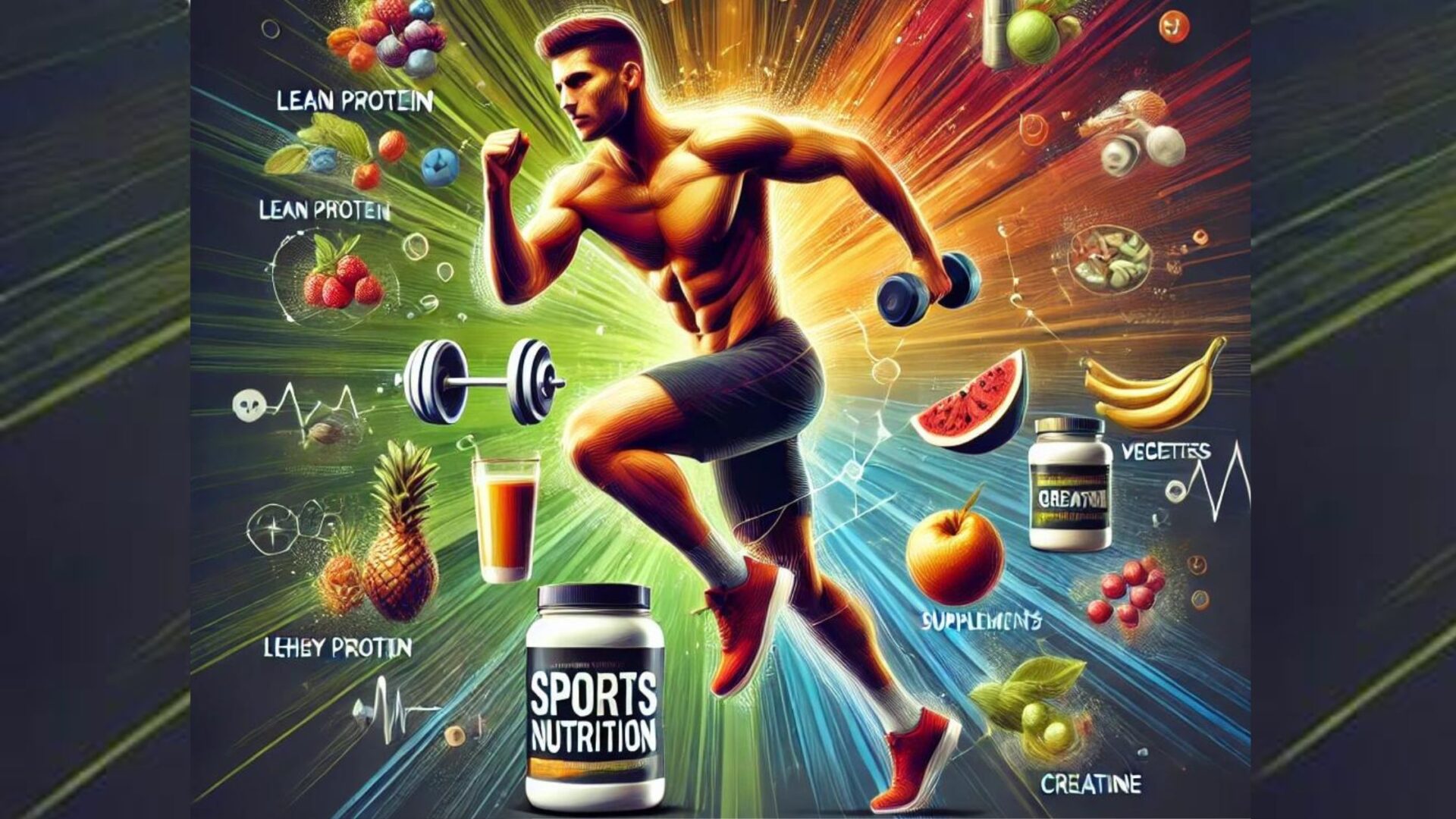Introduction to Sports Nutrition
Fueling your body with the right nutrients is just as important as your workout routine. Sports nutrition ensures optimal performance, faster recovery, and sustained energy. By understanding how nutrition plays a role in physical activity, athletes and fitness enthusiasts can tailor their diets to enhance strength, endurance, and overall performance.
Sports nutrition focuses on macronutrients (carbohydrates, proteins, and fats) that fuel energy, muscle recovery, and endurance. Carbohydrates act as the primary energy source, protein repairs muscle tissue, and healthy fats provide long-lasting energy. Timing your meals around workouts and choosing nutrient-dense foods can maximize performance.
How Sports Nutrition Works
“Sports nutrition focuses on the strategic intake of macronutrients (carbohydrates, proteins, and fats) and micronutrients (vitamins and minerals) to fuel the body during physical activity. Carbohydrates serve as the primary energy source, powering muscles and the brain during workouts. Complex carbohydrates, such as whole grains and vegetables, provide sustained energy, while simple carbs offer quick boosts when needed. Proteins, rich in amino acids, are crucial for repairing and building muscle tissue, especially after intense exercise. High-quality proteins from sources like lean meats, fish, and plant-based options can accelerate recovery. Fats, particularly healthy ones like omega-3s, help maintain hormonal balance, improve endurance, and provide long-lasting energy for endurance sports. Hydration is also key, as water and electrolytes regulate body temperature and prevent muscle cramps.
In addition to macronutrients, micronutrients such as vitamins B, C, and D, as well as minerals like calcium and magnesium, support various bodily functions, from oxygen transport to bone health. Timing meals around workouts — consuming carbs and proteins before and after exercise — enhances muscle recovery and optimizes performance.
By tailoring your diet with the right nutrients, you’ll unlock greater stamina, faster recovery, and the ability to push through physical limits in your fitness routine.”
“Success is the sum of small efforts, repeated day in and day out.” – Robert Collier
INSIDER TIPS: XS™ Sports Nutrition redefines what it means to live a healthy, active lifestyle, whether you’re focused on energy, hydration, strengthening, or recovery. Click here to see for yourself.
Key Components of Sports Nutrition
A well-rounded sports nutrition plan hinges on key components such as carbohydrates, proteins, fats, vitamins, and minerals. Each of these macronutrients and micronutrients plays a critical role in fueling energy, repairing muscles, and enhancing recovery. Understanding how these nutrients work together helps athletes optimize performance and endurance during training and competition.
➤ Carbohydrates: The Body’s Fuel Carbs are essential for maintaining glycogen stores that fuel exercise, particularly in endurance sports. Foods like whole grains, fruits, and vegetables provide slow-releasing carbohydrates that keep you energized throughout your workout.
➤ Protein: Building Muscle and Recovery
Protein plays a key role in muscle repair and recovery. High-quality protein sources such as lean meats, eggs, legumes, and protein supplements help repair microtears in muscle tissue caused by intense exercise, speeding up recovery time.
➤ Fats: Sustained Energy
Healthy fats from sources like avocados, nuts, seeds, and fatty fish provide a steady energy source for longer workouts. Fats are also vital for hormone production, which affects overall health and recovery.
➤ Hydration: Staying Fueled
Proper hydration is critical for peak performance. Water regulates body temperature, transports nutrients, and helps with muscle function. During intense training, electrolyte-rich drinks may be needed to replenish sodium and potassium lost through sweat.
Top Supplements for Athletic Performance
Certain supplements can enhance athletic performance by boosting energy, promoting muscle recovery, and supporting endurance. From creatine to branched-chain amino acids (BCAAs) and beta-alanine, these supplements provide targeted benefits that help athletes push their limits, recover faster, and achieve their fitness goals more effectively.
➤ Creatine: Known for improving strength and power in high-intensity workouts, creatine increases energy production in muscles. It’s especially popular in weightlifting and sprinting sports.
➤ BCAAs (Branched-Chain Amino Acids): BCAAs reduce muscle soreness and speed up recovery by aiding in protein synthesis. Ideal for those engaged in endurance or strength training.
➤ Whey Protein: A fast-absorbing protein, whey supports muscle repair and helps you meet daily protein goals, especially post-workout. It’s an excellent option for boosting muscle recovery after a workout.
➤ Electrolytes: Essential for maintaining hydration and preventing cramps during prolonged exercise, electrolyte supplements help restore key minerals like sodium, potassium, and magnesium.
➤ Caffeine: Caffeine boosts energy levels, improves focus, and delays fatigue during exercise. Found in pre-workout formulas or consumed naturally through coffee or green tea.
INSIDER TIPS: XS™ Sports Nutrition redefines what it means to live a healthy, active lifestyle, whether you’re focused on energy, hydration, strengthening, or recovery. Click here to see for yourself.
Creating a Balanced Sports Nutrition Plan
Creating a balanced sports nutrition plan involves tailoring your diet to meet your specific fitness goals and activity levels. By incorporating nutrient-dense foods, proper meal timing, and hydration, athletes can ensure they get the right fuel for optimal performance. This personalized approach can maximize energy, recovery, and overall results.
Fueling Pre-Workout
Eating a balanced meal that includes protein, carbohydrates, and healthy fats 2-3 hours before exercise ensures that your body has the energy needed to perform. A small snack closer to your workout, like a banana with peanut butter, can provide a quick energy boost.
Post-Workout Recovery
To speed up recovery, aim to eat a meal with a 3:1 ratio of carbohydrates to protein within 30-60 minutes post-exercise. This helps replenish glycogen stores and supports muscle repair. A smoothie with whey protein, spinach, and berries is a great option.
Common Questions on Sports Nutrition
- Why are carbohydrates important for athletes?
Carbs are the body’s main source of energy during exercise. They help maintain glycogen stores, which fuel endurance and high-intensity workouts. - Can I skip post-workout nutrition?
No, skipping post-workout nutrition can delay recovery. Eating protein and carbs after exercise replenishes glycogen and repairs muscle tissue. - Is whey protein necessary for muscle growth?
Whey is a convenient protein source, but it’s not essential. Other high-protein foods can meet your needs, but whey is ideal for fast post-workout recovery. - What’s the best supplement for endurance athletes?
Electrolytes and BCAAs are essential for endurance athletes as they help maintain hydration and reduce muscle soreness during prolonged activity. - How can hydration impact performance?
Even slight dehydration can impair performance, causing fatigue and muscle cramps. Proper hydration is key to maintaining energy and focus. - Should I take creatine if I’m not lifting weights?
While creatine is most effective for strength sports, it can also enhance performance in activities that require short bursts of energy, like sprinting. - What are the benefits of using BCAAs?
BCAAs aid in muscle recovery, reduce soreness, and prevent muscle breakdown during extended exercise sessions. - Can I get enough protein from a plant-based diet?
Yes, plant-based athletes can meet protein needs with legumes, tofu, tempeh, quinoa, and plant-based protein powders. - How does caffeine enhance athletic performance?
Caffeine stimulates the central nervous system, delaying fatigue and improving focus, endurance, and strength during workouts. - Are sports drinks necessary for hydration?
Sports drinks are beneficial for long-duration or high-intensity activities where electrolytes need replenishing. For shorter workouts, water is sufficient.
Conclusion
Mastering your fitness routine goes beyond just working out—it’s about fueling your body with the right nutrients to optimize performance and recovery. A well-balanced diet rich in protein, carbohydrates, healthy fats, and essential vitamins, paired with the right supplements, can significantly elevate your fitness journey. By understanding how sports nutrition works, you can tailor your meals and supplement choices to support your personal fitness goals, ensuring you stay energized and ready to tackle each workout.
Top Supplements for Athletic Performance
Sports supplements can give your body the fuel it needs to perform to achieve peak performance.
For a wider variety of plant-based nutrients, including vitamins, supplements, healthy eating, weight management, heart health, sports nutrition, and energy products, all designed to support your journey to health and well-being, please Visit: Harness the power of plants.
Recommended reading for Herbal Supplements for Energy
“Boost Your Energy Naturally with Herbal Supplements: A Comprehensive Guide” (Read Time: 6 Minutes)
You can visit the NIH for extended Knowledge and Understanding of Dietary Supplements.




